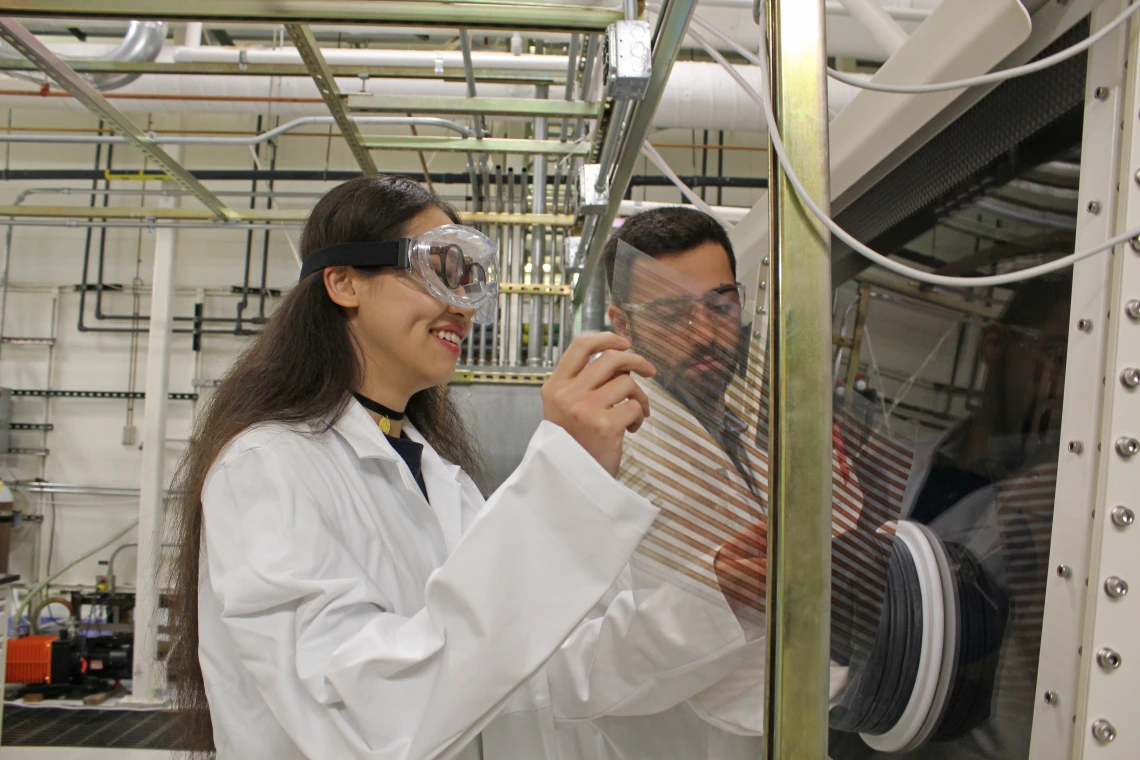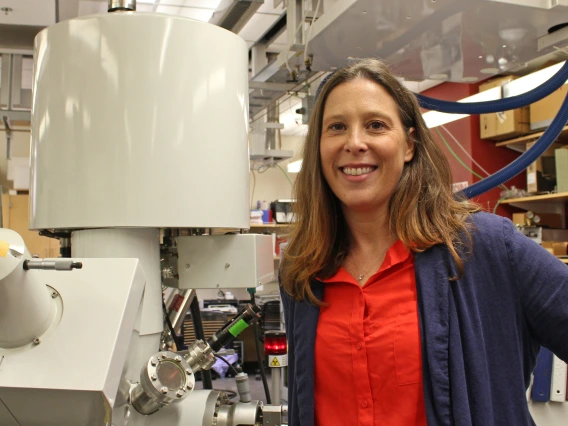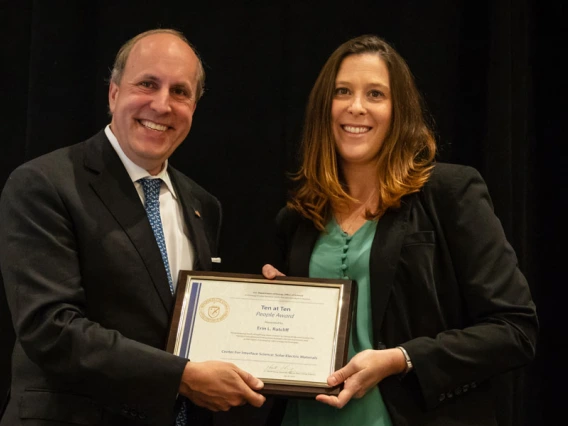EMPOWER STEM Program Creates Student Pathways to Jobs in National Labs
Funded by $748,000 from the Office of Naval Research, the EMPOWER STEM program aims to provide a route to government research jobs, particularly for students from diverse backgrounds.

Zhiting Chen and Michael Anderson, PhD candidates studying materials science and engineering, work in the lab of associate professor Erin Ratcliff. Ratcliff and a team of engineering researchers have created a unique program at the university that builds a bridge between students and government research jobs.
University of Arizona associate professor Erin Ratcliff was fascinated by the work she did as a faculty fellow at the Naval Research Lab in 2017 and again, remotely, in 2020. She wanted her engineering students to see the possibilities of similar positions.
"NRL has cutting-edge, amazing equipment and capabilities, and they have a lot of it," said Ratcliff, an associate professor of chemical and environmental engineering in the UArizona College of Engineering. "They're doing all kinds of highly classified science and technology development – from fundamental concepts to things that almost seem like science fiction."
Ratcliff and a team of engineering researchers have created a unique program at the university that builds a bridge between students and government research jobs.
EMPOWER STEM, funded by $748,000 from the Office of Naval Research, creates connections between Navy scientists and UArizona students and faculty. The program gives students opportunities to learn about the engineering behind the latest technologies in the Department of Defense and Department of the Navy. In return, government labs gain access to a well-prepared, diverse pool of potential employees.
"Being an early-career researcher myself, I know how difficult it can be to promote your research," Ratcliff said. "So, just imagine if you're working for the DON (Department of the Navy) on classified projects with so many extra security precautions. How do you recruit people into your lab? And if you are a student, how do you connect with these people?"
Ratcliff and her colleagues recognized the need to provide a route to government research jobs, particularly for students from diverse backgrounds. They also knew that the university, as a designated Hispanic-Serving Institution and popular choice for veterans, was well-positioned to create such a program and to, hopefully, serve as a model for other universities.
"EMPOWER STEM is a first-of-its-kind outreach, research and training program that partners Naval Research Laboratory scientists and engineers with UArizona students and researchers," said program co-principal investigator Neal R. Armstrong, a Regents Professor of Chemistry and Biochemistry and Optical Sciences. "It aspires to provide 'design guidelines' for all DOD agencies in creating workforce pipelines that guide a diverse student body toward career opportunities in DOD research laboratories, while addressing critical national security needs."
Mentors and Mentees, Across Four Years
The initiative is focused specifically on teaching students about printable electronic devices, such as solar cells, chemical sensors and biosensors, and photodetectors. Printable electronics provide lighter and more affordable alternatives to existing technologies.
"For example, you could imagine a flexible and ultralightweight display or TV that you can roll up and take with you wherever you go," said Adam Printz, assistant professor of chemical engineering and co-principal investigator for the EMPOWER STEM program. "With EMPOWER STEM, we are going to introduce a new generation of scientists and engineers to these technologies, giving them a solid framework in both the fundamental science and applied experience so that they can be the innovators in the very near future."
Juniors and seniors can opt to attend monthly professional development seminars and a weeklong paid boot camp to gain skills in printable electronics. The EMPOWER STEM team also aims to increase awareness of DOD activities among first-year and sophomore students by incorporating information into the curriculum for courses such as Introduction to Engineering.
"We are trying to create a situational awareness training for undergraduates to know more about the scientific world of the DOD," Ratcliff said. "And, also, engaging them with seminars and professional development opportunities to answer questions like: What is grad school? How do you get there? How do you partner with DOD?"
Graduate students will be able to apply for fellowships to serve as mentors to undergraduates and as mentees to Department of Navy scientists. They'll educate undergraduates through efforts such as helping run the boot camp, while also priming themselves to transition to postdoctoral positions in Department of Navy labs.
"Through this collaboration, we'll be able to help give Arizona students early exposure to career options at the U.S. Naval Research Laboratory and potentially open career paths for them at graduation," said Chase Ellis, research physicist at the U.S. Naval Research Laboratory. "The unique laboratory facilities and talent at Arizona are a great complement to our work in visible and infrared sensors for the Navy and Marine Corps."
Program Will First Focus on Student Veterans
Ultimately, Ratcliff wants any UArizona student who might be interested in a DOD career to have the opportunity to participate, but the team is concentrating first on student veterans, who have prior experience with the Department of Defense. In a September 2020 survey of UArizona veteran undergraduates, 64% indicated an interest in working for the DOD in civilian careers, and over 50% indicated an interest in DOD science positions.
The university is nationally recognized for serving student veterans. In U.S. News & World Report's 2021 Best Online Bachelor's Program rankings, Arizona Online ranked No. 5 overall and No. 4 among public universities in its bachelor's program offerings for veterans, as well as No. 16 for its online master's degree in engineering. Additionally, in its most recent awards cycle, the American Society of Engineering Education Military and Veterans Division honored the UArizona College of Engineering with a 2019 Engineering Excellence for Veterans Award.
"The EMPOWER STEM grant will provide unique benefits to our military, veteran and ROTC students," said Cody Nicholls, assistant dean of students, military and veteran engagement at UArizona. "This grant creates a much-needed bridge to better position and align our veteran population for future STEM-specific employment opportunities within the DOD and the DON."



